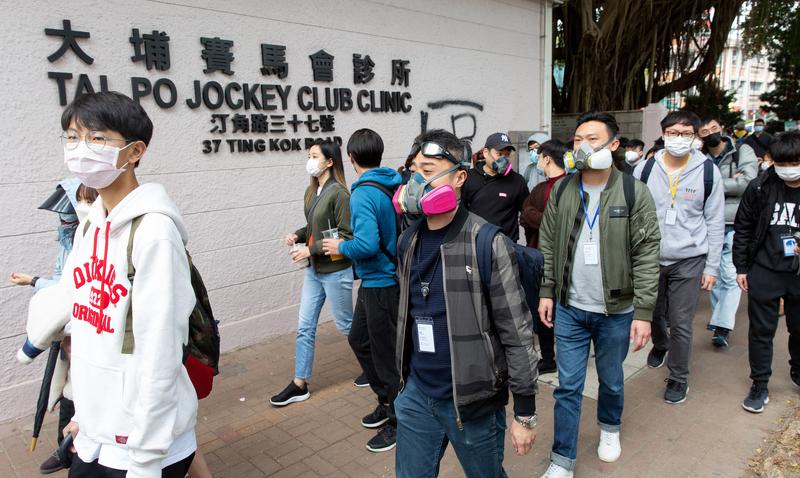 Protesters march down Ting Kok Road in Tai Po on Sunday after the government proposed to designate Tai Po Jockey Club Clinic for treatment of the coronavirus. (PHOTO PROVIDED TO CHINA DAILY)
Protesters march down Ting Kok Road in Tai Po on Sunday after the government proposed to designate Tai Po Jockey Club Clinic for treatment of the coronavirus. (PHOTO PROVIDED TO CHINA DAILY)
Protests against the government’s attempts to designate more quarantine centers increased the risk of mass infections of the novel coronavirus, instead of helping the city avoid a large-scale community outbreak, experts warned on Sunday.
The remarks came after public assemblies - some turning into violent clashes with riot police - broke out in the New Territories on Sunday, with hundreds opposing the government’s plan to designate new quarantine centers or clinics, including in Sai Kung, Tai Po and Fo Tan.
If no one is willing to take the tiny risk (of having a quarantine facility nearby), it’s impossible to control the virus from a community outbreak
Leung Chi-chiu, chairman of the Advisory Committee on Communicable Diseases under the Hong Kong Medical Association
Leung Chi-chiu, a doctor of the respiratory system and chairman of the Advisory Committee on Communicable Diseases under the Hong Kong Medical Association, stressed that any gathering of large crowds increases the risk of virus transmission.
ALSO READ: Arrests after vandalism in Tseung Kwan O
Noting that the epidemic in Hong Kong has turned from imported cases to the disease spreading locally, Leung said people should refrain from participating in any public assembly and stay at home to prevent a community outbreak.
Leung also called on the public to react rationally to the establishment of new quarantine centers and designated clinics.
The virus already exists in our community, Leung said. The designated clinics are to help quickly identify coronavirus patients, while the quarantine centers can keep the close contacts of infected people isolated from the community, reducing the risk of cross-infection, he added.
“In the face of a deadly epidemic, the risk of infection is always there,” Leung said. “If no one is willing to take the tiny risk (of having a quarantine facility nearby), it’s impossible to control the virus from a community outbreak.”
Chow Pak-chin, an ophthalmologist and former vice-president of the Hong Kong Medical Association, said it’s human nature that people will have a “not in my backyard” sentiment against unpleasant things in their neighborhoods.
However, Chow stressed that in addition to benefiting from living in a community, people have responsibilities to make compromises for the greater good of a city.
He said he believes the government made responsible choices after comprehensive evaluation. Calling on the public to trust the administration, Chow said more interpretation on the selected locations is needed to relieve people’s doubts and misunderstandings.
In a statement on Sunday afternoon, a spokesman said the government will keep explaining to residents the operations of a quarantine center while pointing out that the existing three quarantine centers are nearly full.
READ MORE: Travel ban: 25,000 Filipino maids in danger of losing jobs in HK
People isolated in the centers are not coronavirus patients, but close contacts of those suspected or confirmed to have the disease, and those who have been to Hubei province - the epicenter of the epidemic - in the past 14 days, the spokesman said. The government will ensure new quarantine centers are in line with strict standards, while seriously evaluating their impact on their neighborhoods, the spokesman stressed.
People entering the center will be transported with exclusive cars, and will not be allowed to walk about in the community, the spokesman added.


